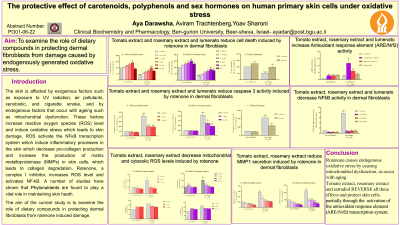Back

Aging and Chronic Disease
(PO01-06-22) The Protective Effect of Carotenoids, Polyphenols and Sex Hormones on Skin Cells Under Oxidative Stress

- AD
Aya Darawsha, PHD student
– PHD student, Ben-Gurion University of the Negev, Beer-sheva, Israel, Iksal, HaZafon, Israel - YS
Yoav Sharoni, PhD
– Ben Gurion University, Israel, Beer Sheva, HaDarom, Israel
Presenting Author(s)
Co-Author(s)
Objectives: The aim of the current study was to examine the damage caused by ROS that originate in the mitochondria due to its dysfunction, or by H2O2, and to examine the protective role of lycopene, rosemary extract and estradiol.
Methods: Human dermal fibroblasts and keratinocyte were used to determine ROS levels and their effect on cell viability, MMP1 and pro-collagen secretion as markers of skin damage.
Results: Rotenone was used to cause mitochondrial disfunction which leads to ROS production, cell death, upregulation of MMP1 secretion and decreased collagen secretion. This was accompanied by activation of the antioxidant response element/Nrf2 (ARE/Nrf2) and NFƙB transcriptional activity. Pretreatment with dietary compounds such as tomato extract containing lycopene and rosemary extract and estradiol reduced ROS level, and MMP1 secretion and increased cell viability and pro-collagen secretion.
Conclusions: These effects can be partially explained by the increased activity of the ARE/Nrf2, and the decreased activity of NFƙB transcriptional activities. This study indicates that carotenoids and sex hormones protect skin cells from ROS-induced damage and may improve skin health and appearance.
Funding Sources: Skin ageing is influenced by several factors including environmental exposure and hormonal changes. Reactive oxygen species (ROS), which mediate many of the effects of these factors, can be formed by extrinsic factors, such as sun exposure, or can result from mitochondrial dysfunction which occurs during ageing. ROS activate the nuclear factor-kappa B (NFƙB) transcription systems leading to inflammatory processes and increased production of matrix metalloproteinase (MMPs) by skin cells, which leads to collagen degradation.
Methods: Human dermal fibroblasts and keratinocyte were used to determine ROS levels and their effect on cell viability, MMP1 and pro-collagen secretion as markers of skin damage.
Results: Rotenone was used to cause mitochondrial disfunction which leads to ROS production, cell death, upregulation of MMP1 secretion and decreased collagen secretion. This was accompanied by activation of the antioxidant response element/Nrf2 (ARE/Nrf2) and NFƙB transcriptional activity. Pretreatment with dietary compounds such as tomato extract containing lycopene and rosemary extract and estradiol reduced ROS level, and MMP1 secretion and increased cell viability and pro-collagen secretion.
Conclusions: These effects can be partially explained by the increased activity of the ARE/Nrf2, and the decreased activity of NFƙB transcriptional activities. This study indicates that carotenoids and sex hormones protect skin cells from ROS-induced damage and may improve skin health and appearance.
Funding Sources: Skin ageing is influenced by several factors including environmental exposure and hormonal changes. Reactive oxygen species (ROS), which mediate many of the effects of these factors, can be formed by extrinsic factors, such as sun exposure, or can result from mitochondrial dysfunction which occurs during ageing. ROS activate the nuclear factor-kappa B (NFƙB) transcription systems leading to inflammatory processes and increased production of matrix metalloproteinase (MMPs) by skin cells, which leads to collagen degradation.

.png)
